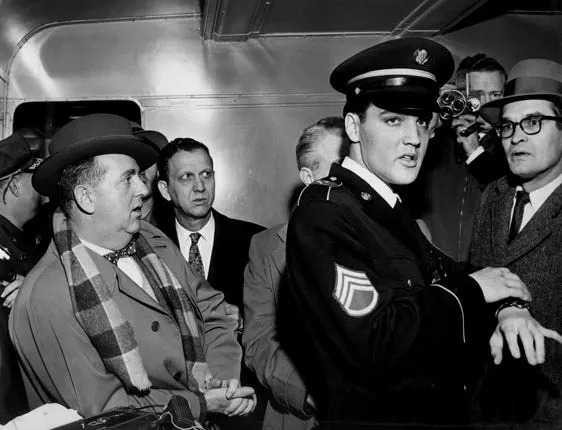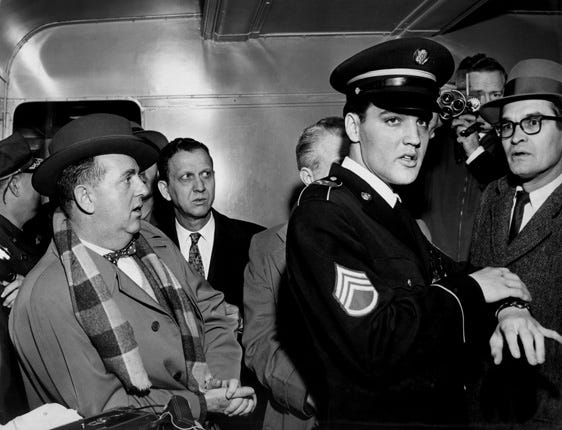“In any book I do, I just want to paint a true picture,” said author and historian Peter Guralnick. “And the picture is not always the one that I might choose or want, but it’s the truth that needs to be told.”
Over the course of an illustrious career Guralnick, 82, has penned a definitive, bestselling and award-winning two-volume biography of rock ‘n’ roll supernova Elvis Presley, co-authored a day-by-day history of the singer, and wrote a bio of the man who discovered him, Sun Records visionary Sam Phillips. Now, with “The Colonel and the King,” Guralnick trains his focus on the man who elevated Presley to superstardom and legend, his controversial manager, Colonel Tom Parker.
Over the years, Parker — a Dutch-born ex-carny and outsized character who shepherded the careers of country stars Hank Snow and Eddy Arnold before linking with the future King of Rock ‘n’ Roll — has become something of a villain in the Presley story. But Guralnick believes the truth of their relationship, and Parker’s role in making him one of the biggest stars of the 20th century is far more important, complex and nuanced, as his book’s subtitle, “Tom Parker, Elvis Presley, and the Partnership That Rocked the World,” suggests.

Col. Tom Parker, left, keeps a watchful eye on his client, Elvis Presley, as the singer returns to Memphis in 1960 after his stint in the Army.
ELVIS PRESLEY AT 90: Decade-by-decade milestones in the life — and afterlife — of the King
“On a broad level, I wanted to do this book either to restore the Colonel to his proper place in the story,” said Guralnick, “or at least to try to make a case for his proper place in the story.”
The book was in large part inspired by Parker’s voluminous archive of letters, which Guralnick first discovered in 1989 as he began work on his Presley bio — though it would take many more years, several other projects and various detours before he could return to Parker’s story in full.
“Reading the Colonel’s letters was such a revelation,” said Guralnick. “It was a revelation to his character, his creativity, his sense of humor, and the fact that he was such a life force. I was so struck by the depth and the creativity and the vitality and the engagement of the letters. And also the eloquence, the real eloquence of somebody who had barely gotten through the fourth grade.”
For years Guralnick conceived of doing a Parker book based around that correspondence “Oh yeah, it was going to be the letters, it wasn’t a biography for a long time. And I still don’t say it’s a full biography now,” said Guralnick, noting that the process of getting deeper into Parker’s life upended his own notions and beliefs about his part in Presley’s career.
“Writing any of these books, whether it’s about Elvis, or Sam Cooke, or Sam Phillips, or Col. Parker, it’s always a process of discovery,” he added. “And so I understood things very, very differently as I got into the process. And it ultimately became a different kind of book.”
For all of Parker’s faults — and Guralnick is upfront about his professional shortcomings and personal problems, including what became a serious gambling addiction — he had an unwavering faith in his client from the start. “He believed in Elvis,” he said. “He believed that he was the greatest. His faith in Elvis had to do with a future which couldn’t be foretold. He and Elvis had a vision of something that had not yet been achieved. Yet, he believed that together they would achieve it.”
ELVIS WEEK 2025: Your guide to Elvis Week at Graceland: 12 events fans of the King won’t want to miss
Despite a lingering reputation as a less than scrupulous businessman, Guralnick said he found no evidence of that. “There was not a single person that Colonel did business with who didn’t speak of his ethics and integrity,” said Guralnick. “Every single person that I talked to, felt he could teach lessons in business ethics. They may have thought he was a character, they may have thought he was limited, but nobody questioned his integrity when it came to business.”
Guralnick notes that the negative public view of Parker was something that came later, only toward the final years of Presley’s life, becoming more pronounced after the singer’s death in 1977.
“As Elvis began to have his personal difficulties, and his behavior became more and more publicly erratic, and certainly after he died, there was a need for some kind of blame,” Guralnick said. “And the easiest thing was to lash out at the manager, who had always promoted the myth of himself as a kind of outlandish Svengali. There’s no question that he created that myth. And he enjoyed the benefits of that for many, many years. But eventually that same reputation would come to work against him.”
For 20 years — from Presley’s death until Parker’s own passing in 1997 — the Colonel made no real attempts to dispel the negative perceptions about him, or his alleged part in Elvis’ demise. “The Colonel’s own philosophy, something that he carried with him to the grave, was that an artist always wears a white hat and a manager must wear the black hat,” said Guralnick. “A manager has to take care that the artist’s reputation is never diminished, is never challenged. The artist always wears a white hat.”
For many years, Parker was supposed to write an autobiography. At one point he got a massive publishing deal to do it, but the memoir never materialized.
“It was going to be an appreciation of the wonderful world of show business. That’s the book he wanted to write,” notes Guralnick. “But the book he got a contract for, and the only book anybody wanted from him was a book about Elvis. In order to write that book, he would either have to not tell the truth — and he was honest person — or he was going to write something in which Elvis was not wearing a white hat. And there was just no way he could do that.”
And so, the task of telling Parker’s story through his words, letters and actions, would eventually fall to Guralnick, becoming the final part of his four-decade study of Elvis and those who made him.
Peter Guralnick at Elvis Week
To mark the publication of “The Colonel and the King,” Peter Guralnick will be in Memphis making a series of appearances during Elvis Week at Graceland. He will join host Tom Brown and a star-studded lineup of Presley’s friends and collaborators for a “Conversations on Elvis” event at 10 a.m. Aug. 15 at the Graceland Soundstage. Guralnick will follow with a pair of book signings, at 2 p.m. Aug, 15 and 3 p.m. Aug 16 at the Elvis Threads Gift Shop.
For more information, go to ElvisWeek.com.
This article originally appeared on Memphis Commercial Appeal: Peter Guralnick talks Elvis, Colonel Tom Parker and new book
